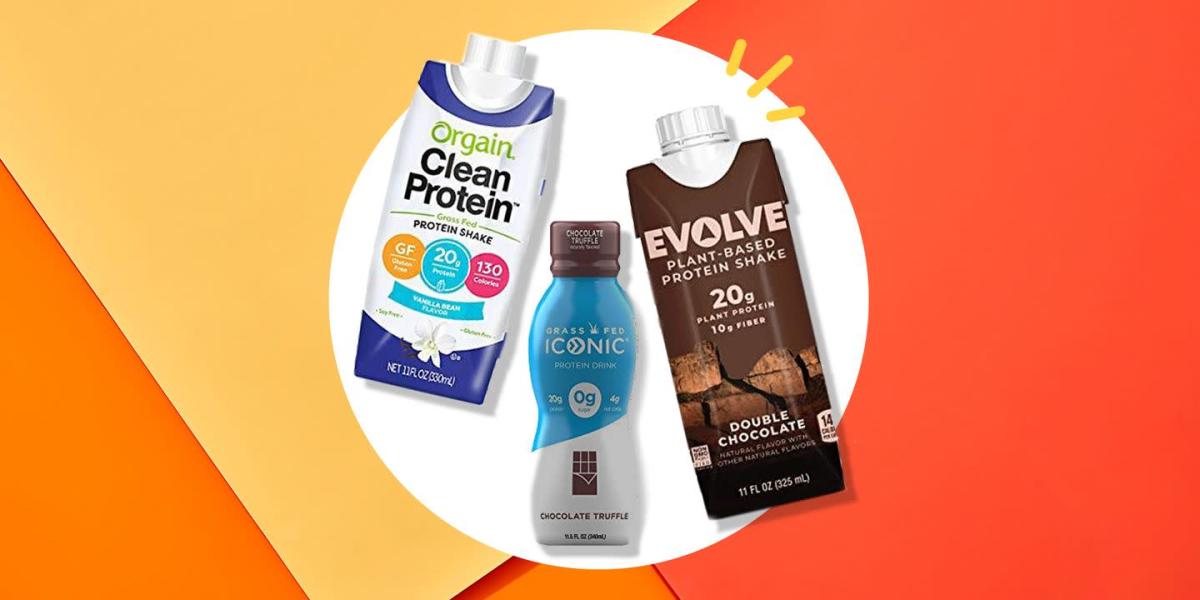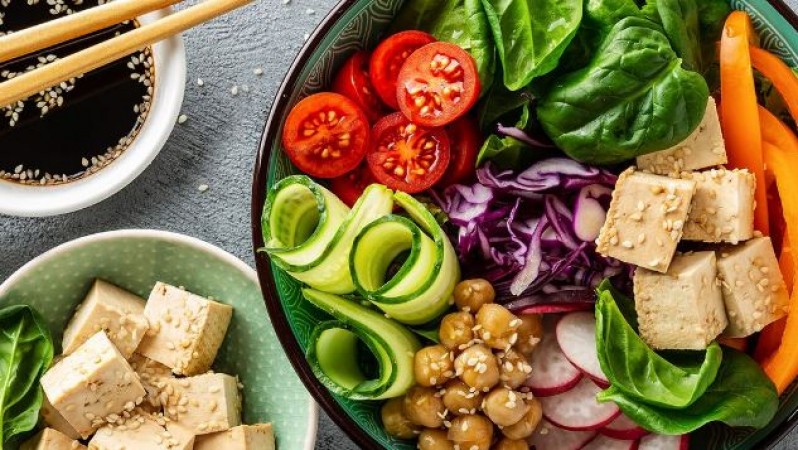Table of Contents

You may aim to eat healthy and get in nutritious, balanced meals, but some days it’s just not gonna happen. Whether you’re short on meal prep time, haven’t been able to hit the grocery store, or just have an insanely packed schedule, it can be hard to even find time to sit down and eat sometimes. This can not only throw off your nutrition, but if you’re trying to lose weight, it can also hinder your progress. An easy solution? Grabbing a meal replacement shake.
It can make sure you’re getting the calories, protein, and nutrients you need even when you’re super busy. Meal replacement shakes can also be a lifesaver when you just don’t feel like cooking (we all have those days). They can also help you avoid snacking on super-processed junk food. And if you’re on a weight loss journey, with a clearly labeled calorie count and nutrients breakdown, they are perfect for keeping you on track.
But not all shakes are created equal. Some are full of sugar and other additives, so do your research to ensure you’re grabbing a healthy drink. To make the process of selecting a meal replacement shake easier, WH asked nutritionists to spell out everything you need to know about meal replacement shakes and exactly how to pick ones that fit with your goals.
First of all, are meal replacement shakes even healthy?
While whole foods are generally the best method for getting the necessary nutrients, meal replacement shakes can be a convenient and nutritiously healthy option on the go, depending on which one you choose, says Amanda Nicole, RDN, a registered dietitian in Los Angeles.
When purchasing one, she points out that it’s important to take into consideration its nutritional content. Some shakes can be lacking in essential vitamins and minerals you would get from eating solid meals.
Store-bought shakes can also be high in added sugar, artificial sugar, or sugar alcohols. “If you consume a shake that is high in sugar, it could make your blood sugar spike and then drop quickly,” explains Nicole. “This will give you a quick release of energy, but make you feel tired shortly after.”
Additionally, when you consume a meal that is high in sugar, you’ll likely feel hungry again shortly afterwards. Sugar alcohols, in particular, may cause gastrointestinal discomfort such as bloating, diarrhea, and gas.
And taking in a lot of artificial sweetener can mess with your taste buds over time, making you crave sweeter and sweeter foods, says Nicole. “When you become used to a high level of sweetness from artificial sweetener, foods that are naturally more tart in flavor, such as berries, will taste more bitter to you.” Basically, healthy snacks like fruits will be less likely to satisfy your sweets cravings when you’re used to the taste of artificial sweeteners.
So, rule of thumb: Look for meal replacement shakes that are low in added sugar, sugar alcohols, and artificial sweeteners.
Are meal replacement shakes good for weight loss?
Meal replacement shakes can be helpful as part of a weight-loss plan for some people. They are a healthy substitute for when you need something quick, replacing what could have been a less-nutritious pick, like fast food.
They can also help you eat fewer calories during the day by replacing meals that may be higher in calories, while still helping you stay full. However, if a shake doesn’t make you feel satisfied (which is likely if has too much sugar and not enough protein), you may reach for more food soon after drinking it, causing you to consume more calories by the end of the day.
“A big part of satisfaction from eating is chewing your food and feeling the texture in your mouth,” explains Nicole. “When you drink your meal, you may be seeking something to munch on soon after.”
If you’re looking to lose weight with meal replacement shakes, you should opt for a product that is high in protein, fiber, and healthy fats to keep you satisfied, and low in sugar to prevent the hunger pangs from hitting later. “If you consume more sugar than these other nutrients, your body will store it as fat,” says Nicole.
Also, you shouldn’t replace more than one meal per day with a shake. Otherwise, you could become deficient in vitamins and minerals from whole fruits, vegetables, whole grains, nuts, seeds, and meat, says Nicole. “A meal replacement shake is just that, a single meal replacement,” she says. So, only reach for them when you’re really in a pinch.
When is the best time of day to have a meal replacement shake?
There isn’t a right or wrong time; it depends on what works best for you. “If you don’t have time for breakfast or [you] work through lunch, a shake can be great during those times,” Nicole says. “It can be a great alternative to breakfast, especially if you don’t like to eat first thing in the morning, as breakfast gives your body enough energy to start the day.”
If you don’t have time for lunch, a shake could give you the energy to make it through the second part of your day, she adds. “The time that you consume a shake won’t impact your life in any way, and you shouldn’t feel like you should sacrifice a meal with friends or family to have a shake.”
What are the best meal replacement shakes to buy?
In addition to seeking out shakes and bars that are high in protein, fiber, and healthy fats, as well as low in sugar, it’s key to opt for those that also contain vitamins and minerals, particularly from fruits and vegetables.
“All these components give you a balanced meal and keep you feeling full and satisfied for longer,” says Nicole. “A well-balanced meal shake or bar will include 300 to 400 calories, 15 to 30 grams of protein, three or more grams of fiber, and 10 to 15 grams of unsaturated fat.”
Good sources of protein are whey, soy, hemp, brown rice, and pea protein. Look for natural sugars, such as cane sugar, brown rice syrup, or coconut palm sugar, and check the ingredients for good quality, plant-based fat from nuts, seeds, or plant-based oils, suggests Nicole.
One thing to note is that most meal replacement shakes range from 150 to 250 calories. This is more like a snack, so if you’re replacing a full meal with one of these lower-calorie options and still feel super hungry, make sure to have additional whole food snacks around this time as well.
“Some whole food snacks that you should keep on hand include homemade trail mix (a combination of granola, dried fruit such as raisins, and nuts like walnuts). Trail mix can curb your appetite with its high protein and heart-healthy fat content,” says Jonathan Valdez, RDN, the owner of Genki Nutrition and a spokesperson for the New York State Academy of Nutrition and Dietetics.
Here are a few suggestions from him:
-
Greek yogurt with berries, apple slices with peanut butter, and whole-grain crackers topped with canned tuna fish. “Adding your own berries such as blueberries and strawberries to a cup of plain Greek yogurt can give it a healthy antioxidant boost. This is a good snack to have on hand to keep you full with its high-protein and low-calorie content,” says Valdez.
-
Apple slices with peanut butter. It satisfies your appetite with fiber from the fruit and protein from the peanut butter, he says.
-
Whole grain crackers with canned tuna fish. This also makes for a delicious and filling snack since it’s packed with fiber and protein.
Here are 12 meal replacement shakes, plus how to make it into a nutritious meal:
This shake is perfect on the go because it doesn’t have to be refrigerated until opening. It provides 20 grams of pea protein and is high in fiber, vegan, dairy-free, soy-free, and gluten-free.
“This product is excellent if you’re following a vegan diet, are celiac, or lactose-intolerant,” says Nicole. “To make it a complete meal and add in some heart-healthy fats, add a handful or ¼ cup of almonds.”
Per serving: 140 calories, 2.5 g fat (0.5 g saturated fat), 17 g carbs (10 g fiber, 4 g sugar, 11 g added sugar), 350 mg sodium, 20 g protein
This shake offers 20 grams of grass-fed milk protein and is vegetarian, gluten-free, soy-free, kosher, and high in calcium.
“Complete this meal with an apple and a tablespoon of almond butter to give you enough fiber, carbohydrates, and healthy fats to make it a balanced meal,” says Nicole.
Per serving: 130 calories, 2 g fat (1 g saturated fat), 9 g carbs (1 g fiber, 3 g sugar, 3 g added sugar), 170 mg sodium, 20 g protein
This shake provides 20 grams of grass-fed whey and casein milk protein and is low in sugar and high in fiber. It’s also lactose-free, free of hormones and antibiotics, gluten-free, soy-free, kosher, and contains no artificial sweeteners or artificial ingredients.
Per serving: 140 calories, 3 g fat (0.5 g saturated fat), 8 g carbs (4 g fiber, 0 g sugar), 105 mg sodium, 20 g protein
This shake provides 20 grams of protein from peas, pumpkin, and flax seeds, and is an excellent choice if you have allergies, says Nicole. OWYN shakes are free of some of the top allergens, including dairy, soy, gluten, egg, peanuts, and tree nuts. It also contains a blend of greens from broccoli, spinach, and kale. Complete this meal, like some of the others, by having a banana or one slice of whole-wheat bread with a tablespoon of peanut butter.
Per serving: 300 calories, 10 g fat (1 g saturated fat), 31 g carbs (3 g fiber, 5 g sugar), 330 mg sodium, 20 g protein
“These shakes are a high-protein, low-calorie drink to keep you full. It contains 180 calories, 20 grams of protein, five grams of fiber, and 24 different vitamins and minerals,” says Valdez. To make it a full meal, it’s “probably best to pair with fruit for some extra calories, fiber, and antioxidants since 180 calories are low,” he suggests.
Per serving: 180 calories, 9 g fat (1.5 g saturated fat), 7 g carbs (5 g fiber, 1 g sugar), 150 mg sodium, 20 g protein
“These shakes are perfect for maintaining muscles while trying to lose weight,” says Valdez. He recommends complementing this drink with fruits for extra calories, fiber, and antioxidants since it only has 150 calories.
Per serving: 150 calories, 1.5 g fat (.5 g saturated fat), 6 g carbs (2 g fiber, 1 g sugar), 240 mg sodium, 30 g protein
These are extremely calorie-dense shakes at 400 calories, 20 grams of protein, three grams of fiber, and 39 essential vitamins and minerals.
“You definitely don’t need extra food to make up for the caloric deficit,” says Valdez. However, he points out that the fiber content is low and may need additional fiber from other sources such as fruits to keep you fuller.
Per serving: 400 calories, 24 g fat (2.5 g saturated fat), 38 g carbs (3 g fiber, 1 g sugar, 1 g added sugar), 300 mg sodium, 20 g protein
This vegan shake gives you 20 grams of pea protein and contains 30 percent of daily recommended values for iron, calcium, phosphorus and potassium, says Nicole. It’s also dairy-, nut-, soy-, and lactose-free. To make it a well-rounded meal, enjoy with a cup of carrots and a serving of hummus.
Per serving: 200 calories, 8 g fat (1 g saturated fat), 13 g carbs (2 g fiber, 9 g sugar), 370 mg sodium, 20 g protein
This shake is another great on-the-go option that doesn’t have to be refrigerated. It also has 20 grams of protein from milk and Greek yogurt. Complete this meal with an apple and a tablespoon of almond butter to give you enough energy and keep you full, says Nicole.
Per serving: 160 calories, 3 g fat (2 g saturated fat), 11 g carbs (0 g fiber, 11 g sugar), 105 mg sodium, 20 g protein
Filled with all kinds of plant-based goodness, this vegan-friendly shake packs 12 grams of protein from pea and brown rice that will keep you satiated for hours after. It’s also made with superfoods like turmeric and Maca root and contains zero added sugar. You can even use it as a dairy-free creamer for your morning coffee.
Per serving: 110 calories, 5 g fat (0.5 g saturated fat), 8 g carbs (2 g fiber, less than 1 g sugar), 190 mg sodium, 12 g protein
These shakes are USDA-certified organic and 100 percent plant-based. Their delicious taste comes from organic coconut sugar and monk fruit extract rather than artificial sweeteners or sugar alcohol. Since they’re soy-free, gluten-free, and dairy-free, They are perfect for people on all kinds of diet and those with food intolerances.
Per serving: 180 calories, 6 g fat (3.5 g saturated fat), 11 g carbs (3 g fiber, 5 g sugar), 360 mg sodium, 20 g protein
With 20 grams of plant protein and tons of superfoods like broccoli, ancient grains, and carrots, these shakes live up to their promise to help you conquer any goals. Drinking one is good for your weight loss journey and overall health—it gives you a cup of fruit and vegetable phytonutrients, 32 mg of DHA omega-3, and probiotics.
Per serving: 150 calories, 4.5 g fat (0.5 g saturated fat), 8 g carbs (3 g fiber, 5 g sugar), 360 mg sodium, 20 g protein
You Might Also Like
https://ca.news.yahoo.com/look-meal-replacement-shake-sure-120000171.html







